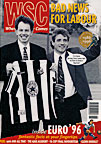 The FA took their time didn't they? And even then Howard WIlkinson and Frank Clark were on standby. What a caper
The FA took their time didn't they? And even then Howard WIlkinson and Frank Clark were on standby. What a caper
The next couple of months will be an interesting time for Glenn Hoddle and Terry Venables, as they edge towards a handover date.
Much has been pointlessly made of whether or not Hoddle was the first choice of the FA to replace Venables in due course; after all, in 1990 they chose Graham Taylor as the ideal candidate to replace Bobby Robson. (If only Doug Ellis wasn’t such a shy, retiring type; had he stamped his feet and shouted a bit more in an effort to hold on to the man who took Villa to runners-up spot, then the history of the world might have turned out a little different.)
What matters with Hoddle is that, succeed or fail, his selection as coach represents a desire to move in the right direction. Though any direction is better than none. Graham Taylor couldn’t even be relied upon to have the courage of his convictions, to pursue the Jack Charlton or Egil Olsen route to its deadly conclusion (yesterday’s philosophy now, long abandoned by practically everyone at domestic level).
Perhaps more importantly, after a World Cup Finals in which a coup by the players had persuaded England to adopt a more continental approach, the national team was saddled with a new manager seemingly keen to move in the opposite direction. It is unlikely that Hoddle will follow suit given his publicly stated approval of Terry Venables’ as yet rather inconclusive experiments in trying to turn Premiership base metal into international gold during the last two years.
Some questioned whether he had the necessary experience – including, bizarrely, Geoff Hurst, a former Chelsea manager with a record few would envy (Glenn’s brief, but clearly more successful, Stamford Bridge spell is assessed elsewhere in this issue). Given the regular failure of successful club managers at international level, a full trophy room is no guarantee of future triumphs. And look at the examples from abroad of Beckenbauer et al . . . perhaps that’s why Geoff’s not so keen on the idea.
There is no guarantee that Hoddle will improve on England’s woeful record in major tournaments (regular qualification would be an achievement in itself), but if he is given until the next European Championships to work in then as long as he stays true to his principles, win or lose, the risk the FA have taken will have been a success in one important way. We will have learnt something about English football.
We don’t mean principles of the kind to which Kevin Keegan has clung in recent weeks (ie that goalscoring is sexy and exciting, and organized defending is tedious, grown-up stuff that true purists shouldn’t have to bother with – Hoddle can surely be relied upon to seek quality at the back as much as in the centre of the pitch, having positioned both himself and at times Ruud Gullit there in the teams he has managed).
If Hoddle tries to make his team play in the way you would expect him to, then we should finally get an answer to the basic question, to which we fleetingly received a positive answer in 1990: are English footballers good enough to play at the top level internationally? If he does stick to his principles, then no-one should vilify him whatever his results.
The honeymoon, though, will sadly last only until the first defeat – Moldova’s never an easy place to visit in September, we’ve heard . . .
From WSC 112 June 1996. What was happening this month